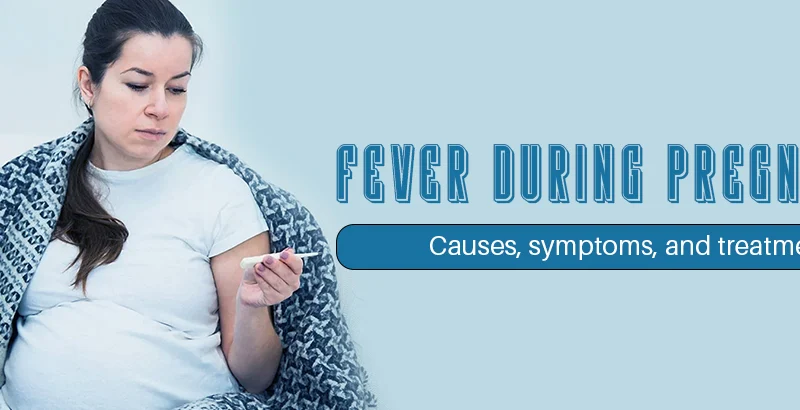Fever During Pregnancy: Causes, Symptoms and Treatment

The hormonal and immunological changes during pregnancy can cause your body and mind to undergo several changes—swelling, tiredness, emotional turmoil, and so on. It is also not uncommon for you to feel hot flashes, but at times, you might just have to keep the thermometer close to you. Fever is also normal during pregnancy. When your body temperature goes above 100.4 degrees Fahrenheit (38 degrees Centigrade) that means you’re down with fever.
As per research one-third of pregnancies have a fever at any time during pregnancy that is accompanied by colds, flu, cough and a runny nose.
All you need to do is understand the connection between pregnancy and fever. Early detection is prevention.
Fever During Pregnancy In First Trimester
The first trimester indicates you’re slowly embracing the exciting and not-so-exciting journey of motherhood through physical as well as emotional fluctuations. Along with the first trimester symptoms, fever in the first weeks of pregnancy may be a common occurrence.
A fever is an indication that your body is trying to combat infection. A mild fever may not be a cause for concern, but a high fever can be slightly worrisome and may not positively affect the developing baby in your womb.
Studies have shown that between 1996 and 2002 children were born with birth defects like Neural tube defects (NTDs) or spina bifida, heart defects as well as facial deformities such as cleft lip or palate.
Although the true reason behind first-trimester maternal fever and birth defects in babies may be a mystery, some scientists have come up with evidence that either viral infections could be the root cause of the problem, or fever could be the main trouble.
Is Fever a Risk for Miscarriage in the First Trimester of Your Pregnancy?
It’s not uncommon for a pregnancy to end suddenly before the 20th week. The chances of pregnancy loss or miscarriage in the first trimester are high for several reasons (chromosomal abnormalities, placental problems as well as maternal health conditions), but fever may not be on the top of the list. However, infection-causing fever may result in a miscarriage or pregnancy loss.
Fever During the Second and Third Trimester of Pregnancy
A singular study has pinpointed crucial insights into the causes of acute undifferentiated fever specifically within the second and third trimesters. Some common reasons behind fever in this phase include urinary tract infection, intrauterine infection, influenzas, common cold, intestinal disorder, nausea, vomiting, etc.
Additionally, as you enter the second trimester and third trimesters these are some of the main players behind high fever.
- The pregnancy hormones (the hormonal changes that raise the body temperature).
- The oxygen-carrying blood increases by 50% and flows through the skin to make you glow and feel warmer.
- The developing little ones inside you give off their body heat that you absorb, thus making you hotter inside out.
How to Treat Cold and Fever in Pregnancy?
When dealing with a fever during pregnancy, it’s vital to approach treatment wisely. Doctors often recommend safe over-the-counter medications that can effectively reduce fever without posing risks to your developing baby. However, it’s essential to consult with your healthcare provider before taking any medication to ensure it aligns with your specific health needs. You can also try out some home remedies like:
- Staying hydrated
- Gargling in salt water
- Taking steam
- Including folic acid and vitamin C in your pregnancy diet
- Getting properly vaccinated
- Getting adequate rest
Fever may come and go away during pregnancy without causing any harm. Just be mindful of symptoms like body and headache, chills, pain, a bitter taste in the mouth and so on.


